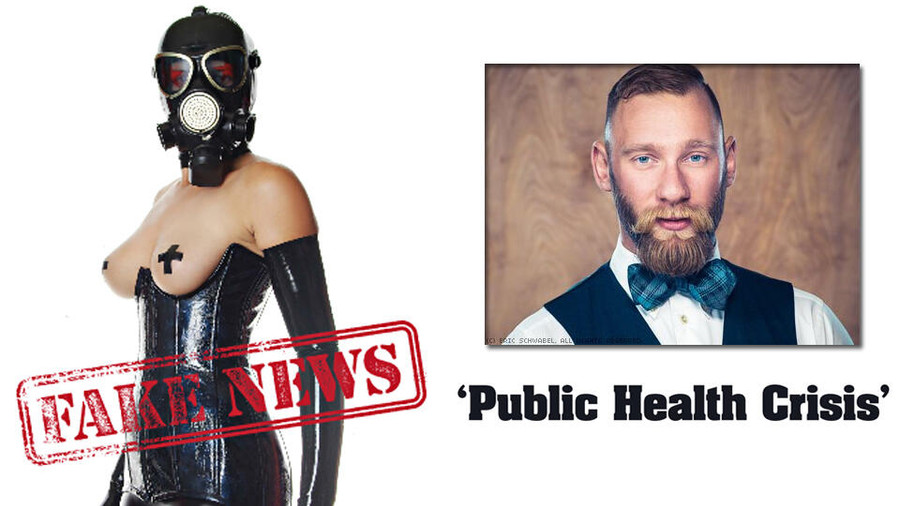We are witnessing the early stages of a moral panic, the likes of which we have not seen since the Reagan Administration.
As I write this, there are 27 states in the process of passing mandatory porn filters for computers sold in-state. Half a dozen states more are looking to pass resolutions declaring porn “toxic” or a “public health crisis.” One state, Utah, has passed legislation that would allow parents of children who have accessed adult content to sue the producers for damages.
It is time for us to step up, united, like never before, because porn may not be a ‘public health crisis’ but ignorance and apathy are.
The laws are blatantly unconstitutional, and the science behind them bunk. But like so much of this current political moment, the insanity of the situation doesn’t protect us from the fallout.
In November, after the election, I spoke with several large adult producers who suggested that Trump was a social moderate and wouldn’t care about adult content. I don’t know anyone so sure of that now.
During his campaign, President Trump signed a pledge declaring that adult content does not deserve First Amendment protections. We now have a conservative Congress and Justice Department itching for him to make good on his word.
For religious conservatives, anti-sex legislators and anti-porn censors, the rise in accessibility of adult material, coupled with a conservative political moment, has become a cause for action. They claim that this access to porn will result in more sexual assault, destroy marriages and contribute to a myriad of other social ills, from sexual dysfunction to homosexuality.
Ironically, over the past two decades, the same period in which adult content thrived, sex crimes, including sexual assault, plunged. The divorce rate declined to a 35-year low. Teen pregnancy is rarer than it has been in the past 50 years. The anti-porn activists may paint a picture of a world out of control, but the facts don’t support it. What the data shows instead is that men who watch porn are more likely to agree with feminist principles, to have better sex lives; and to greater tolerance for sexual diversity.
Still, this drumbeat against adult industry continues. It may be nonsense, but if we don’t fight it in the press, the legislatures and the courts, we’re going to see 40 years of free speech rolled back rather quickly. That means a return to bans on pleasure product sales in conservative states, a return to declined bank accounts and billing problems for adult providers. A return, even, to vice raids and obscenity prosecutions and outright bans on certain types of adult speech.
Or worse. These current laws, as silly as they might seem, are laying the groundwork for a large-scale attack against our industry. Free speech in the U.S. does not cover an incitement to violence, whether that’s yelling “fire!” in a crowded theater, phoning in bomb scares, hate speech or making death threats.
If the argument can be made that adult content by its very presence is harmful and dangerous, we’re likely to see our historical protections evaporate quickly.
It is no coincidence that Utah, the first state to pass legislation declaring porn a public health crisis, followed up with legislation encouraging parents to sue adult producers for damages. While such a lawsuit against you might be ludicrous, the legal fees would not.
It’s up to us to change the narrative. The longer we allow bad science to go unchallenged, and legislative pushes to go uncontested, the easier it becomes for those to become building blocks of greater incursions.
That’s why we’re making sure the Free Speech Coalition is the leading voice against these initiatives. Faced with dozens of simultaneous attacks, we’re developing a comprehensive policy wing, that will not only track the legislation and respond to claims, but will serve as a resource for journalists, legislators, legal teams and FSC members.
In the past month, I’ve been to Washington D.C., New York and Sacramento, meeting with likely allies. We’ve written letters of support to progressive legislation in Hawaii and anti-porn legislation in Utah.
But as with Prop 60 and Cal/OSHA, we’ll need your help if we’re going to win. Membership dues and donations go to monitoring and analyzing legislation, they go to outreach with legislators and communications with journalists. They go to meetings with the FBI and members of Congress and partner organizations like the ACLU.
We’ll also need you to help combat the “fake news” behind the public health crisis. Our resource center will help you when you talk with friends, press or your own legislators. In the next few months, look for statements and resource guides that help us defeat the fear-mongering and sexual fascism.
We face a frightening landscape on many fronts. It is time for us to step up, united, like never before, because porn may not be a “public health crisis” but ignorance and apathy are.
Eric Paul Leue is the executive director of the Free Speech Coalition.







